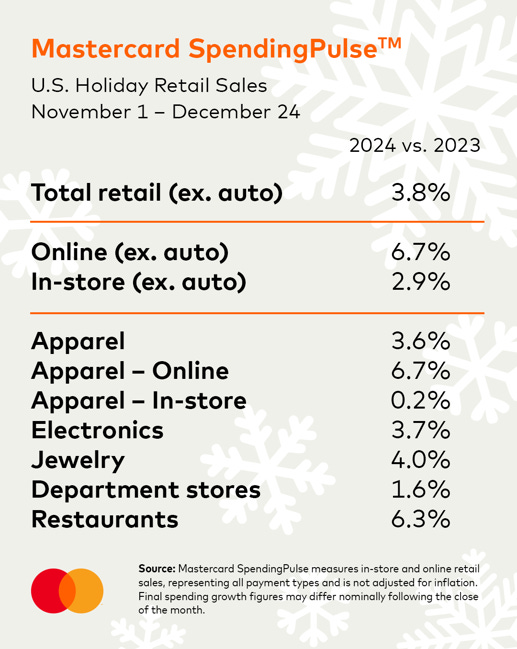This Week in Retail #59
Hey Friends,
This is the first official TWIR of 2025. While I’ve published and shared a few stories and began the member chat throughout the holdiays, I’m excited to get back to our regularly scheduled programming.
As a reminder to my industry friends, I’ll be heading to NYC for The National Retail Federation’s Big Show. I’ll be covering the most important topics from Keynotes and Big Idea Sessions, while also walking the floor and highlighting disruptive retail technology and solution providers. I’m expecting a ton of engagement around embracing the “phygital” experience, friction-easing checkout (because it’s never frictionless) and RFID everywhere. I think AI will be top of mind, but I’m expecting more of the conversation to be around how AI can embrace the human worker rather than automate tedious tasks. A personal touch goes a long way in today’s competitive retail environment, and I’m eager to hear how retailers are leveraging technology to drive positive, connected experiences.
If you are interested in meeting up at the show, use this link to connect with me directly.
Lets start with some holiday news……..Retail sales in the U.S. (excluding automotive) grew 3.8% between November 1 and December 24 compared to 2023, according to Mastercard SpendingPulse. Online sales rose 6.7%, while in-store sales increased 2.9%.
Some Drivers Behind the Data
Value-Driven Shopping: Consumers prioritized promotions, particularly during Black Friday and late December.
Experience Spending: Restaurant sales grew 6.3%, reflecting strong demand for dining out.
Gift Sectors Growth: Apparel (3.6%), Jewelry (4.0%), and Electronics (3.7%) saw notable spending increases.
Digital-First Preferences: E-commerce remained top of mind, with curbside pick-up and delivery gaining traction.
Solid spending reflects consumer confidence, supported by a strong labor market and household wealth gains. Retailers capitalized on demand by balancing promotions across physical and online channels, meeting value-minded consumers where they shopped.
Retailers hired 280,500 seasonal workers in November, a 5% decline from last year, marking the second-lowest total since 2022, according to Challenger, Gray & Christmas. Seasonal hiring for October and November totaled 414,400 jobs, down 7% year-over-year. Retailers are on pace to hire 8% fewer seasonal workers for Q4 compared to 2023.
Key Trends:
Shift to Transportation & Warehousing: Hiring in these sectors rose 11% in November, driven by increased online shopping. These roles often offer higher wages and benefits than retail jobs.
Cautious Hiring: Employers are wary of economic uncertainty and regulatory shifts, contributing to higher job cuts and slower hiring.
Rising Sales: Despite hiring declines, retail sales in October and November increased 6.1% and 5%, respectively, totaling $282 billion in November.
Experts suggest retailers may not meet last year's hiring levels but could surpass the predicted 520,000 seasonal jobs.
Credit card defaults in the U.S. reached their highest level since the 2008 financial crisis, reflecting the financial strain on lower-income consumers after years of high inflation and elevated borrowing costs.
Key Highlights:
Write-Offs Surge: Credit card lenders wrote off $46 billion in seriously delinquent loans in the first nine months of 2024, a 50% increase from the same period in 2023 and the highest in 14 years.
Low-Income Impact: Lower-income households are especially stretched, with zero savings rates, while high-income households remain stable.
Rising Delinquencies: Delinquency rates, a precursor to defaults, peaked in July and remain nearly a percentage point higher than pre-pandemic levels.
Contributing Factors:
Inflation and Interest Rates: Pandemic-era spending and supply chain issues led to inflation, prompting the Federal Reserve to raise borrowing costs.
Ballooning Balances: Credit card debt surpassed $1 trillion in mid-2023, with balances rising $270 billion in 2022–2023.
Interest Payments: Americans paid $170 billion in credit card interest in the 12 months ending September 2024, straining budgets.
Outlook:
Federal Reserve: Rate cuts expected in 2025 will likely be smaller than previously forecasted, providing limited relief.
Economic Risks: Potential tariffs by President-elect Donald Trump could exacerbate inflation and interest rates, posing further challenges for consumers in 2025.
Future Defaults: Delinquencies suggest continued distress, with $37 billion in credit card balances at least one month overdue.
Experts caution that while consumer spending power has diminished, the situation may worsen without significant economic shifts.
This is by far my favorite story regarding Walmart that I’ve written…….The so-called “Walmart Birkin Bag,” officially listed as the "KAMUGO Genuine Leather Handbags Purse for Women," is gaining attention as a budget-friendly alternative to the luxury Hermès Birkin. Priced between $78 and $102, the bag features genuine leather, a gold lock for security, and comes in four colors: green, orange, blue, and iron gray.
Dubbed the “Wirkin,” it has a 4.7-star customer rating, with buyers praising its quality and craftsmanship. While the bag’s style is reminiscent of the Birkin, the manufacturers have not marketed it as a dupe. As of now, all variations are sold out on Walmart’s website, with no confirmation of restocks. This 100% will show up on StockX. I’m all over the place on dupe culture, that conversation is best had over a drink, but this speaks volume to the demographic of customers Walmart is gaining marketshare with.
Walmart was named Yahoo Finance's 2024 company of the year. Walmart's stock has surged nearly 80% this year, driven by booming sales and strategic investments. In an exclusive interview, CEO Doug McMillon credited pre-pandemic investments in wages, education, e-commerce, technology, and lower prices for the company’s success.
Walmart is attracting higher-income customers, drawn by convenience, even as inflation impacts food prices more than general merchandise. McMillon highlighted the company’s preparedness for potential trade war tariffs under President-elect Trump, emphasizing efforts to keep prices low.
He also expressed enthusiasm for generative AI, describing its potential to transform customer interactions into personalized, time-saving experiences akin to personal shopping assistance.
As someone who writes about retail, I completely understand the fatigue associated with Walmart and Amazon always at the top of the list, but there’s nowhere to hide them. Big retailers are outspending smaller competitors in capital expenditures, with Walmart alone investing $21 billion in 2023. This massive spending allows them to innovate with automation and improve customer experiences, giving them a significant advantage over regional and independent retailers. Supermarkets, once dominant in grocery sales, have seen their market share decline from 66% in 2000 to 54% in 2023, while warehouse clubs and supercenters like Walmart and Costco have nearly doubled theirs to 23%.
Walmart's prices remain a key competitive edge, with groceries 21% cheaper than at major supermarket chains and 9% cheaper than dollar stores in 2024. Amazon has shifted from price matching to leading with discounts, further pressuring competitors.
Dunkin’ kicks off the new year with a collaboration featuring Sabrina Carpenter and her limited-time drink, "Sabrina’s Brown Sugar Shakin’ Espresso." Launching December 31, this iced beverage combines bold espresso, brown sugar, and oat milk, hand-shaken for a frothy, subtly sweet flavor. The release is celebrated with the playful ad campaign Shake That Ess’, featuring Carpenter and created by Artists Equity, Ben Affleck’s and Matt Damon’s company.
In addition to the signature drink, Dunkin’ introduces a $5 Meal Deal, offering two Wake-Up Wrap sandwiches and a medium coffee, and new winter menu items like the Lava Cake Signature Latte and Chocolate Whoopie Pie Specialty Donut. These offerings aim to satisfy cravings and energize guests as they enter 2025.
In other Dunkin News…..Native has launched collaborations with Dunkin’ and Jarritos, offering personal care products like deodorants, body washes, and lotions inspired by the brands’ signature scents. The Dunkin’ line is available on Native’s website and at Walmart, while the Jarritos collection can be purchased on Native’s website and at Target. CEO Chris Talbott emphasized the brand’s focus on creating scents that evoke memorable experiences.
Petco has become the first national pet specialty retailer to carry Reese Witherspoon's Draper James lifestyle brand, offering pet apparel, toys, accessories, and essentials starting at $2.99. Additionally, cat brand Jupiter is debuting exclusively at Petco with items starting at $3.99, and Petco’s private label Youly has introduced Valentine’s Day-themed products. Enhancements to Petco’s in-store experience include grab-and-go items under $10, gift sections for pet parents, and curated displays of new products.
Best Buy customers in select U.S. markets can now schedule deliveries of small items up to seven days in advance, with a two-hour delivery window. This service, currently available in cities like Minneapolis, Chicago, Houston, and Atlanta, will expand nationwide next year. Best Buy partners with multiple gig carriers for these deliveries.
The new option builds on Best Buy's efforts to enhance the customer delivery experience. Recent innovations include a live tracking feature for large-item deliveries like TVs and refrigerators, providing real-time updates and reducing customer service calls.
Additionally, Best Buy has introduced a generative AI-powered virtual assistant to assist with delivery changes and partnered with DoorDash for on-demand electronics delivery. CEO Corie Barry emphasized these advancements improve convenience, confidence, and cost efficiency for shoppers.
Tractor Supply Co. has announced a multiyear initiative to bring more last-mile deliveries in-house, focusing on bulky items like fence panels and riding lawnmowers. The company aims to leverage its network of stores and mixing centers for an asset-light delivery solution. Chief Supply Chain Officer Colin Yankee highlighted plans for "hub stores" to consolidate drivers and inventory for efficient deliveries within 40 miles of stores.
The initiative promises significant customer experience improvements, with in-house deliveries showing a 10x lower return rate and 13% higher satisfaction compared to third-party carriers.
By 2025, Tractor Supply plans to establish its final-mile team, implement routing technology, and expand test market coverage. By 2028-2029, it aims to cover 90%-95% of large-item orders, scale in-house operations, introduce premium services, and increase route density to reduce costs.
Destination XL Group Inc., a retailer specializing in big-and-tall men's apparel, confirmed a non-binding buyout proposal from Fund 1 Investments. The offer of $3 per share represents a 34% premium over DXL’s Dec. 19 closing price.
The proposal does not include a financing condition. DXL’s board of directors will evaluate the offer alongside other strategic options with their financial and legal advisors. Following the announcement, DXL's stock rose to $2.84 on the Nasdaq.
U.S. stocks delivered strong gains in 2024, though a rough final week erased the S&P 500’s post-election rally. Investors with market-representative portfolios saw significant wealth growth this year. Wall Street strategists expect market returns to moderate in the coming years following this extended period of strong growth.
Key Index Performance:
S&P 500: Up 24%, slightly below 2023’s 24.2%, marking the strongest two-year streak since the late 1990s.
Nasdaq: Gained 30.8%, trailing 2023’s 43.4%.
Dow Jones: Rose 12.8%, down from 28.4% last year.
Russell 2000: Increased 10.9%, below 2023’s 15.1%.
Notable Trends:
No "Santa Claus rally" this year, with all indexes declining since Christmas.
U.S. stocks remain over two years into a bull market.
New York’s cannabis industry has surpassed $1 billion in retail sales, nearly three years after legalization and following significant reforms to the Office of Cannabis Management (OCM). Governor Kathy Hochul credited the milestone to efforts prioritizing equity, public safety, and community empowerment. OCM’s 2024 report highlighted growth in consumption, licensing improvements, and medical program expansion. Officials predict the industry will double its sales to $2 billion by 2025. On March 31, 2021, New York State legalized adult-use cannabis through the Marijuana Regulation & Taxation Act (MRTA). The legislation established the Office of Cannabis Management (OCM) and a Cannabis Control Board to regulate and oversee the state’s cannabis market. This move set the foundation for New York's equity-focused and community-driven cannabis industry.
A report by Stand.earth reveals that over 100 fashion brands are tied to oil and gas fracking in the Permian Basin, Texas, due to their reliance on fossil-fuel-derived synthetic fibers like polyester, nylon, and acrylic. While 57 brands, including Ralph Lauren, Puma, Levi’s, and H&M, have policies to phase out virgin polyester, many continue to depend heavily on these materials. Inditex and Lululemon were highlighted for significant use of synthetic fibers, with Lululemon’s products comprising over 72% fossil-fuel-based materials.
Synthetic fibers, linked to climate change and waste, are projected to account for 73% of global apparel production by 2030. The fashion industry, already the third-largest polluter globally, emits nearly 10% of annual greenhouse gases. Stand.earth’s Fracked Fashion Map connects fashion supply chains to fracking and petrochemical production, emphasizing the industry's role in driving fracking expansion.
The map traces materials to six leading fracking companies and highlights the gap between brands’ sustainability claims and practices. Stand.earth calls for urgent action to address the environmental and social toll of the fashion sector’s reliance on petrochemical-derived materials.
Sodexo plans to open nearly 100 Food Hive markets at U.S. colleges by 2026, with around 30 locations slated for the 2024–2025 academic year. Food Hive offers a fast, cashless convenience store experience featuring products from local, minority, and women-owned businesses, as well as healthy options tailored to student needs.
Sodexo’s research highlights Gen Z’s preference for convenient, inclusive shopping experiences with meaningful variety, healthy options, and frictionless checkout. The Food Hive concept aims to meet these expectations while fostering community connections.
The first Food Hive at Northern Arizona University will open in spring 2025, offering diverse food and grocery options with a modern design and self-checkout for efficiency.
This week, President Joe Biden awarded Ralph Lauren the Presidential Medal of Freedom, making him the first fashion designer to receive this honor.
The Presidential Medal of Freedom is the highest civilian honor in the United States, recognizing individuals who have made exemplary contributions to the prosperity, values, or security of the nation, world peace, or other significant societal endeavors.
Ralph Lauren, aged 85 at the time of the award, began his career in the mid-1960s with a line of ties and has since transformed American fashion with iconic items like the Polo shirt. His designs blend East Coast prep with Western cowboy aesthetics, promoting an aspirational image of America. Beyond fashion, Lauren is known for his philanthropic efforts, particularly in cancer care, prevention, and environmental causes through his foundation.
That’s all folks……Have a great week.







